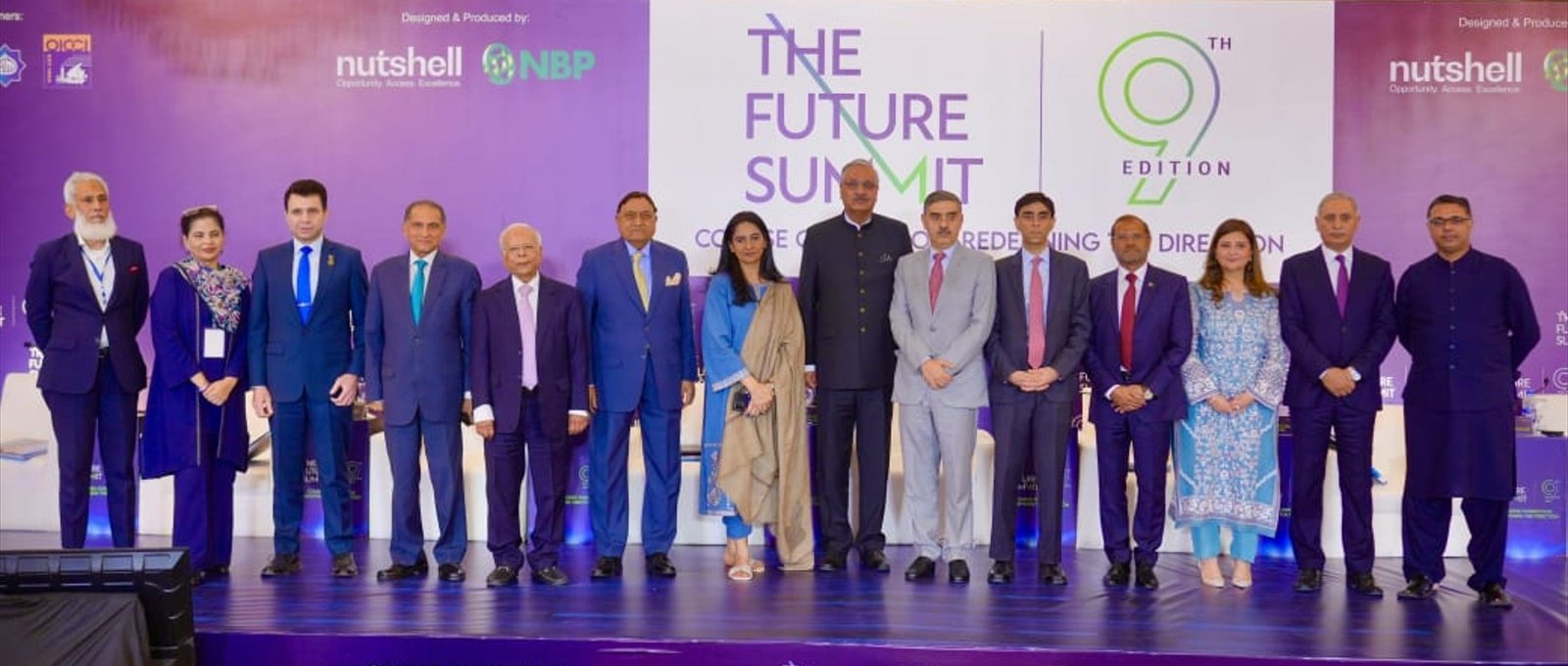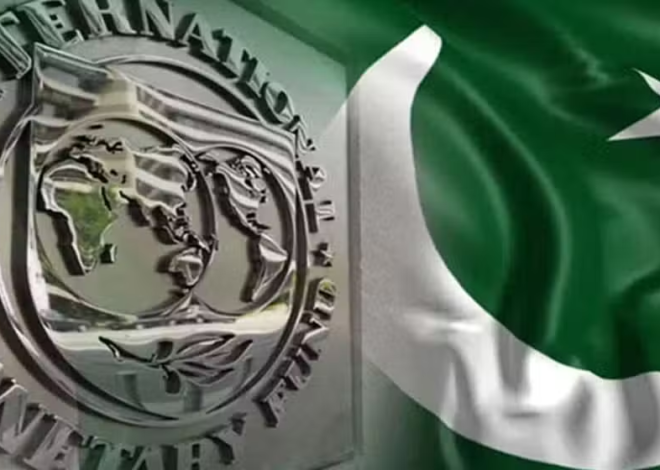
TFS 9th Edition Advances Conversations on Climate, Leadership & Islamic Finance on Day Two
Karachi, November 6, 2025 — THE FUTURE SUMMIT (TFS) 9th Edition continued its second day in Karachi with a forward-looking agenda centered on geo-politics, sustainability, responsible leadership, and financial transformation. Following a high-energy opening day focused on economic course-correction, institutional renewal, and technology-led growth, Day Two deepened the debate around long-term value creation with discussions on geo-political strategy, climate economy, organizational purpose, and the evolution of Islamic finance.
TFS 9th Edition was co-hosted by the Nutshell Group and National Bank of Pakistan (NBP), in strategic partnership with Faysal Bank Limited and the Overseas Investors Chamber of Commerce & Industry (OICCI).
Themed “Course Correction: Redefining the Direction,” the SUMMIT set the tone for two days of powerful strategic discourse, where diverse perspectives converged to shape actionable insights.
“The Geopolitical Chessboard – Pakistan at the Strategic Crossroads” proved to be a resounding closing session bringing together Pakistan’s foremost thought leaders, strategists, and policymakers to examine the nation’s position in an evolving global order.
The session, chaired by Senator Anwaar-ul-Haq Kakar, Pakistan’s 31st Prime Minister, underscored that Pakistan’s future lies in strategic convergence, where diplomacy, defense, and development move in harmony to navigate uncertainty. Wrapping up the session, Senator Kakar said, “Creativity is hidden in concealed moments, and we need to capitalize ours.”

Opening with a powerful keynote from Gen Zubair Mahmood Hayat, N. I., Chairman Joint Chiefs of Staff Committee (2016-2019), the session aligned with “Reassessing Pakistan’s Strategic Position Amid Global Power Transitions.” Commenting on the need for redefining General Hayat stated, “Multipolarity allows Pakistan to chart relations beyond Washington and Beijing; and emergence of regional power clusters make multilateralism more relevant.”
The dialogue advanced through four thematic tracks, from strategic realignment and geoeconomic transformation, to technology-driven defense, and narrative diplomacy; highlighting deep insights on how Pakistan can synchronize security, economic, and foreign policy objectives in a fragmented world.
Air Chief Marshal Sohail Aman, Pakistan’s Chief of Air Staff (2015-2018) commenting on Air Power, Technology & the Future of National Defense and victory of the air force said, “We built institutions, respected the policies of predecessors, became technologically strong and independent, only then we succeeded.”
Commenting on Geoeconomics in Transition: Pakistan and the New Power Map, Dr. Ishrat Husain, Author, Economist, former Federal Minister & Governor, State Bank of Pakistan said, “We need to tap into export of services to meet global demand. Remittances are the earnings of our people and WTO recognizes this as export of manpower.”

Dr. Moeed Yusuf, Vice Chancellor, Beaconhouse National University, in his address on Strategic Convergence – Aligning Security, Economy & Foreign Policy, said, “There is only one goal and that is human security. Every citizen needs safety, security, and dignity. Everything else is secondary. If social indicators are down, it is a loss, despite any given success.”
Sharing his views on The Geopolitical Recalibration: Balancing Great Power Competition, Ambassador Aizaz Ahmad Chaudhry, Pakistan’s Former Foreign Secretary & Chairman, Sanober Institute said, “The world is changing at a more rapid pace than ever before. Most alarming global trends are unilateralism among large countries; and hyper-nationalism particularly in major powers.”
In the final conclusive note, Muhammad Azfar Ahsan, Founder & Chairman, Nutshell Group & Pakistan’s former Minister for Investment, while thanking the esteemed speakers, delegates and moderators, reaffirmed the need for Re-Direction for unified destination. “It is not a question of surviving but thriving, Pakistan must learn to act as one nation with common goals to do that.” Investments will be pivotal, he said, but facilitation of the present investor is necessary for attracting global businesses in future.
The day had opened with Shaping the New Climate Economy hosted by Spectreco LLC. Speakers included Faraz Khan, CEO & Managing Partner, Spectreco LLC, USA; and Sajjeed Aslam, Partner & Co-Founder, Spectreco LLC, USA. The dialogue highlighted climate innovation, green financing opportunities, decarbonization pathways, and the shift toward regenerative business models. Reiterating the urgency, Faraz stated, “We need to consider sustainability as an intergenerational investment, and an opportunity for access to capital and market growth.” Commenting on the need for strong leadership, Sajjeed informed that USD 15-20 billion is allocated by international institutions over the next 10 years for Pakistan. “We just need Climate Leaders to develop and lead green projects.”
Beyond Profit: Purpose, People & Progress examined the rising global imperative for purpose-led business and social value integration. Speakers included Sami Wahid, General Manager, Coca-Cola Pakistan & Afghanistan Region; Andleeb Abbas, Senior Advisor, FranklinCovey Pakistan; M. Haroon Qassim, Managing Director, PharmEvo Private Limited; Asif Ahmad, Group Chief Business Solutions Officer, PTCL Group; Muhammad Samiullah Siddiqui, CFO, Oxford University Press & Vice President, ICAP; and Momina Tariq, SEVP & Chief Human Resources Officer, Askari Bank. Moderated by Rabia Ahmad, Director & CEO, Nutshell Group, the discussion focused on redefining corporate responsibility through inclusion, governance, workforce well-being, and ethical growth. Asif underscoring strong internal culture, stated, “Objective and purpose must be ingrained in the values and culture of every organization. Earning profits is not intrinsically bad, as it helps us add more value to the lives of customers.”
The Financial Frontier: Reform, Resilience & Renewal, included a dialogue on The Future of Islamic Finance participated by Mufti Muhammad Hassan Kaleem, Shariah Advisor; Muhammad Atif Hanif, Chief Executive Officer of Al Baraka Bank (Pakistan) Limited; and Imtiaz Gadar, CFA, Chief Executive Officer of Al Meezan Investment Management Limited. The discussion, moderated by Mohammad Shoaib, CFA, CEO & Co-Founder, Lucky Investments Limited, delved into how Islamic finance products and structures can evolve to meet digital era demands while preserving Shariah integrity. Mufti Kaleem explained the essence of Islamic and Sharia finance stating, “Everything conventional is not Un-Islamic. We should talk about products and financial arrangements as being acceptable in Sharia instead of labelling them Islamic. ‘Riba’ the term has to be understood and explained in essence.”
This was followed by another Fireside Chat titled Beyond Stability: Crafting the Next Economic Playbook featuring Syed Muhammad Shabbar Zaidi, Author, Economic Analyst, & 26th Chairman of the Federal Board of Revenue; Khurram Husain, Senior Business & Economy Journalist; and Ali Khizar, Director Research, Business Recorder, and moderated by Assad Hameed Khan, Country Head, ACCA Pakistan. The discussion underscored how Pakistan can leverage its demographic, regional and finance advantages to reposition itself in the global market. Ali, giving a comprehensive outlook stated, “We are in the 4th year of low growth and need innovative ideas from both public and private sectors to break the cycle.” Syed Muhammad Shabbar Zaidi also underscored the need for long-term goals by stating, “In our country the primary problem is that decisions are taken in a hurry. We take steps for immediate results, while reforms take decades to bear fruit.”
With interspersed Q&A sessions, profound insights, and key take aways, TFS 9th Edition proved to be a strong showcase of voices and actionable strategies best positioned for determining the ‘Course’ ahead.







